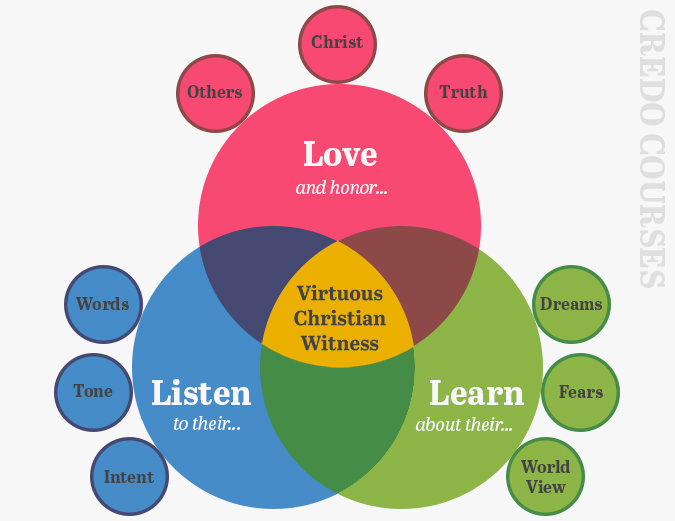
The Man Who Wrote the Book (Literally)
Dr. Douglas Groothuis invested around eight years writing Christian Apologetics. At 752 pages it is a massive treatment. [inlinetweet prefix=”” tweeter=”” suffix=””]In fact, the good doctor acknowledged that the hardback version could double as a weapon.[/inlinetweet] Both old and new apologists can benefit from reading this volume.
Dr. Groothuis was in campus ministry for many years and holds two degrees:
- M.A. in philosophy from the University of Wisconsin
- Ph.D in philosophy from the University of Oregon
What Are Some Common Pitfalls a New Apologist Should Avoid?
Quick Tips for the New Apologist
- Love: [inlinetweet prefix=”” tweeter=”” suffix=””]Apologetics is about honoring Christ as Lord first.[/inlinetweet] We should also show respect for those we proclaim the gospel to. Newcomers sometimes miss this and come off as only caring about winning arguments.
- Listen: Dr. Groothuis recommends a calm environment for apologetics. Busy and distraction prone settings make it difficult to listen and communicate. Good listening is like the first step in the phrase: ready, aim, fire.
- Learn: [inlinetweet prefix=”” tweeter=”” suffix=””]Whether an apologetical encounter is good or bad, there’s always something to learn.[/inlinetweet]

Getting Caught Up in the Apologetical Moment
Discussing ideas that will effect someone’s eternity comes with a lot of responsibility. This is good. Our concern for God’s glory and the souls of others should weigh on us. This responsibility can make us feel excited and even nervous. This is especially common for new apologists. You may recognize some of these physical, emotional, and mental warning signs:
- Uneven breathing, clammy palms, and a racing heart
- Nervous laughter
- An over eagerness to speak and an inability to hear what the other person is saying
- Facial expressions that don’t match the conversation
- Shuffling feet, shaking hands, and twitching eyelids
- Asking questions like a lawyer (e.g. leading the witness)
- One arm that’s longer than the other from carrying a bullhorn
- Using Christian terms with a non-christian audience without providing explanations
An experienced apologist is hard to pick out of a crowd (unless they’re addressing the crowd). Their evenness of tone and measured responses don’t stand out. They look just like anyone else engaged in conversation. This isn’t because they’re ambivalent. They’ve simply learned how to be measured in their interactions.
Evangelism With A Loving Heart
[inlinetweet prefix=”” tweeter=”” suffix=””]Evangelism should flow from a loving heart. If it isn’t love that motivates us, we’re liable to fall into the trap of pragmatism.[/inlinetweet] Emotion is a powerful way to exert influence on someone. Sometimes it’s the easiest way, but it isn’t loving to focus on just the emotion and leave the will and mind to fend for themselves. The greatest commandment enjoins us all to be well rounded Christians:
And you shall love the Lord your God with all your heart and with all your soul and with all your mind and with all your strength.
— Matthew 12:30 (ESV)
Winning arguments is certainly a part of apologetics, but it can’t be the end goal. It’s possible to win every argument by sheer force of will and not glorify God at all. The end goal (as with all things in the Christian life) should be the glory of God. To the extent that winning an argument accomplishes that end, it’s good.
Video Transcript
I think someone who has just gotten the apologetics bug and is interested in arguments and so on can be insensitive to others such that the person doesn’t listen to other people (just dumps apologetics on their head).
And good apologetics, virtuous Christian witness, always involves loving and caring for the other person, listening to the other person, interacting, trying to figure out what the other person’s worldview is and what their life experiences are. And then your knowledge of defending Christianity as true, rational, and pertinent comes out through the dialogue and through a loving exchange.
Apologetics is not about defeating other people’s arguments. Now you want to win arguments. I’m a philosopher. I always want to win arguments. But I don’t want to win arguments on the cheek, on the cheap rather. I don’t want to just intimidate people and browbeat them. I want to give good reasons, make sure the other person understands, be able to take the criticisms that that person has of my worldview.
So what I’m saying is, we want to develop a deep truth seeking dialogue with others that will draw out what we know and furthermore reveal what we kn… we don’t know. So we need to be humble. And humble doesn’t mean, “I don’t really know what I believe or why, but let me tell you my opinion.” That’s ignorance. But we need to be humble in terms of loving others, not putting ourselves first, and to be willing to be corrected. And if we know something that’s significant, and we have some good arguments, be thankful to God, the giver of every good and perfect gift, that He has made those known to us.
Feedback
What about you? What’s your story? Did you go through some of these stages as a new apologist? Did it go well? What did you learn? Comment below buy cheap ativan from usa and start the conversation.

